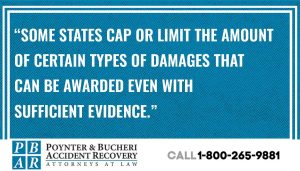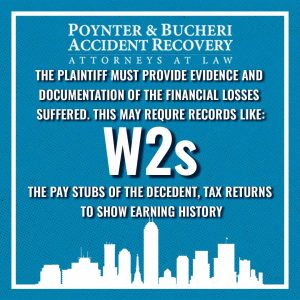
What Are Pecuniary Damages in Wrongful Death?

When a loved one dies due to someone else’s negligence or intentionally harmful actions, the emotional pain and suffering can be immense.
In addition to this mental anguish, the death of a family member often results in financial losses for the surviving spouse and other family members who depend on the deceased person’s income, services, and other contributions.

These financial losses are known as pecuniary damages in a wrongful death lawsuit.
Unlike personal injury claims where the plaintiff can recover damages for pain and suffering they experienced such as after a car accident, a wrongful death lawsuit allows surviving family members to be compensated for what they suffered due to the decedent’s death.
While no amount of financial compensation can make up for the tragic loss of life, recovering pecuniary damages can help provide economic security for those left behind.
What Types of Economic Damages Are Considered Pecuniary Damages?
Pecuniary damages awarded in a wrongful death or survival action case refer to the financial, monetary, and economic losses suffered by the deceased person’s family and estate as a result of their death.
Some of the most common types of pecuniary losses that may be recovered include:
- Loss of future earnings and earning capacity
- Loss of benefits like health insurance, retirement accounts, etc.
- Loss of the value of household services
- Burial expenses
- Medical expenses related to the injury before death
Other out-of-pocket costs stemming from the decedent’s death like childcare expenses or relocation costs may also potentially be recovered.
These damages do not include compensation for things like the survivors’ mental anguish or loss of companionship. While these are very real losses felt by the family, they are considered non-economic damages that may or may not be recoverable depending on the case and the state’s laws.
How Are Pecuniary or Punitive Damages Proven in Wrongful Death Cases?
To recover economic damages in a wrongful death personal injury claim or lawsuit, the plaintiff must provide evidence and documentation of the financial losses suffered for the judge or jury.
This may require gathering records like:

- The pay stubs of the decedent, W-2s, tax returns to show earning history
- Testimony from economists or financial experts on calculating future lost income
- Documentation of any employer-provided benefits like health insurance that were lost
- Receipts and invoices for medical bills related to the fatal injury
- Funeral expenses and burial costs
- Documentation of household services the decedent provided like cleaning, yardwork, childcare, etc.
The plaintiff essentially needs to “make the case” for how much financial support and services the deceased provided and quantify what was lost to make a fair personal injury claim for pecuniary or punitive damages.
Without this documentation, it becomes very difficult to accurately calculate an appropriate amount of pecuniary loss.
In wrongful deaths involving the death of a child, calculating pecuniary loss is more complicated since children do not yet have established earning histories. However, expert testimony on potential earnings based on academic performance, career plans, and economic modeling may be used.
Are There Limits on Recovering Pecuniary Damages in Wrongful Death Cases?
How and whether damages are recoverable in a wrongful death claim or lawsuit depends heavily on the specific state laws that apply to the case.
Some states cap or limit the amount of certain types of damages that can be awarded even with sufficient evidence.
Some key considerations around recovering pecuniary or punitive damages in wrongful death cases include:
- The deceased person’s age, earning capacity, health, and life expectancy at the time of death
- Whether the deceased person was married and/or had dependents like children relying on them financially
- The state’s laws on damage caps or limits for certain types of pecuniary loss like future earnings or household services
- The specific facts and circumstances surrounding the decedent’s death, such as details of a car accident, and how it caused pecuniary losses for the survivors
It’s critical to work with an experienced wrongful death attorney who understands the nuances of your state’s laws and can document and present a strong case given your specific circumstances.
Hire a Lawyer for Wrongful Death Actions and Pecuniary Damages
Given the complexity of proving pecuniary and other damages in a wrongful death action, having the right legal representation is crucial.
An experienced attorney can:
- Determine if you have grounds for a viable wrongful death claim
- Identify and carefully document all sources of damages
- Obtain expert testimony
- Advocate for maximizing recovery
- Skillfully negotiate with insurance companies and attorneys of the defendant
- Take your wrongful death case to trial if a reasonable settlement can’t be reached
No amount of pecuniary damages can compensate for the loss of a loved one’s life. However, making a strong claim for the financial and economic losses from the wrongful death can provide financial security during a difficult time.
If you have lost a spouse, parent, or other close family member due to someone else’s actions, speak to a wrongful death lawyer to understand your rights and options for recovering pecuniary damages.
Don’t delay, as there are strict time limits for filing wrongful death claims. Our team is ready to present your case to a judge or jury and help you move forward after your loss.
Contact Poynter & Bucheri for a free case evaluation by calling 1-800-265-9881.
